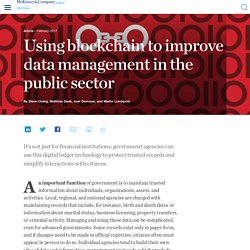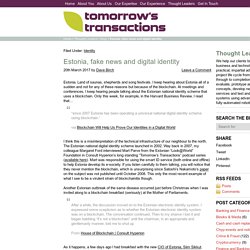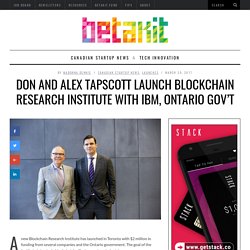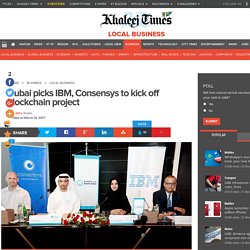

Using blockchain to improve data management in the public sector. It’s not just for financial institutions; government agencies can use this digital ledger technology to protect trusted records and simplify interactions with citizens.

An important function of government is to maintain trusted information about individuals, organizations, assets, and activities. Local, regional, and national agencies are charged with maintaining records that include, for instance, birth and death dates or information about marital status, business licensing, property transfers, or criminal activity. Managing and using these data can be complicated, even for advanced governments. Some records exist only in paper form, and if changes need to be made in official registries, citizens often must appear in person to do so. Individual agencies tend to build their own silos of data and information-management protocols, which preclude other parts of the government from using them. Estonia, fake news and digital identity. Estonia.

Land of saunas, shepherds and song festivals. I keep hearing about Estonia all of a sudden and not for any of these reasons but because of the blockchain. At meetings and conferences, I keep hearing people talking about the Estonian national identity scheme that uses a blockchain. Only this week, for example, in the Harvard Business Review, I read that… “since 2007 Estonia has been operating a universal national digital identity scheme using blockchain.”via Blockchain Will Help Us Prove Our Identities in a Digital World.
Chinese industry giants and government bodies to collaborate on blockchain framework for IoT. Chinese industry giants and government bodies to collaborate on blockchain framework for IoT Tuesday, March 21, 2017 6:21 AM UTC Chinese ecommerce giant Alibaba Group, multinational telecom company ZTE, China Unicom, and China’s Ministry of Industry and Information Technology are going to team up for creating a blockchain framework for Internet of Things (IoT), Bitcoins Channel reported.

The Trump Administration is Buying Into Blockchain Tech. High-level US regulators and officials spoke out in favor of expanding the adoption of blockchain technology across government and the private sector at the DC Blockchain Summit, held this week in the nation’s capital.

There, representatives from the Trump administration, Congress and executive branch agencies acknowledged the potential of blockchain, and called for further development at the technology’s intersection with public policy. Specifically, they highlighted the technology's potential to streamline bureaucracy, empower consumers and drive economic growth. Notably, Mark Calabria, chief economist for Vice President Mike Pence, made an unscheduled presentation Wednesday to tell the gathering that the administration of the president is encouraged by developments in blockchain technology. He said there's an enthusiasm to see what possible applications exist in government, finance and elsewhere, particularly as the Treasury Department conducts a full review of the financial system.
Congress is Starting to Seriously Consider Using the Blockchain. The U.S. dollar has been the official currency of the United States since 1785, but recently, the government has taken a formal interest in a system of monetary exchange that bears no presidential portraits, and is better known for facilitating shadowy drug deals on the internet than balancing a budget.

In early February, Jared Polis, a Democratic Congressman from Colorado, and David Schweikert, a Republican from Arizona, established the Congressional Blockchain Caucus, a lobbying group that aims to prod, bug, and inform other legislators about Blockchain’s potential to revolutionize the way the federal bureaucracy spends money. Blockchain supporters have been claiming for years that the secured public ledger technology, which provides the foundation for Bitcoin and other cryptocurrencies, could bring some much-needed transparency to government. Don Tapscott Announces International Blockchain Research Institute. The government of Canada, in partnership with other government bodies and private sector companies, is establishing a Blockchain Research Institute in Toronto to bring together the top minds in public and private sector research to build blockchain-based economies around the world.

Like the early days of the internet when defense and research agencies worked together to build the internet, the new foundation is hoping to engage researchers and companies that are willing to set aside their organizational biases and personal interests to develop the best possible models to go forward building a blockchain-based economy. Don Tapscott, co-author of the bestselling book Blockchain Revolution, announced the new initiative yesterday at the DC Blockchain Summit hosted by the Chamber of Digital Commerce. Funding will be drawn from a joint public-private partnership involving governments and some of the world’s biggest corporations, as well as new blockchain startups.
Rationale Implementation. Don and Alex Tapscott launch Blockchain Research Institute with IBM, Ontario gov't. A new Blockchain Research Institute has launched in Toronto with $2 million in funding from several companies and the Ontario government.

The goal of the Institute is to study blockchain’s effect on various industries. The Toronto Star reported that blockchain experts and father-and-son duo Don and Alex Tapscott co-founded the Institute. UAE-based Etisalat Academy to host blockchain workshop and seminar from 21-23 March. UAE-based Etisalat Academy to host blockchain workshop and seminar from 21-23 March Monday, March 20, 2017 8:32 AM UTC Etisalat Academy, the provider of telecom training in the MEA, is going to organize a blockchain seminar and workshop from March 21-23 at its premises in Dubai, Gulf News reported.

Titled “Blockchain: The Next Disruptive Technology”, the educational event will discuss the current industry and government trends in blockchain and distributed ledger technology. It will also focus on how this technology can improve the efficiency within an organization. The workshop will be held on 21 and 22 March, followed by one-day seminar on March 23rd. Dubai picks IBM, Consensys to kick off blockchain project. Smart Dubai Office announced on Tuesday the selection of IBM and Consensys for a city-wide plan partnership to implement bitcoin database technology blockchain.

The move is as per the Dubai Blockchain Strategy 2020 announced in October 2016 by the Dubai Future Foundation and the Smart Dubai Office and is the first of its kind in the world. The goal is to become paperless by shifting all transactions to blockchain - an online encrypted database - by 2020. The announcement marks an important step forward in our commitment to delivering Dubai's Blockchain Strategy announced late last year by Sheikh Hamdan bin Mohammad Al Maktoum, Crown Prince of Dubai, said Dr Aisha bin Bishr, director-general, Smart Dubai Office. "We are working towards our goal of making Dubai the first blockchain-powered government in the world by 2020.